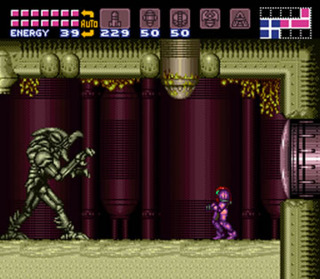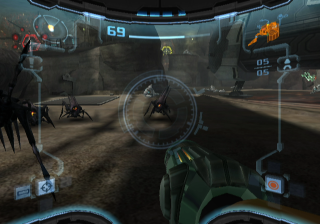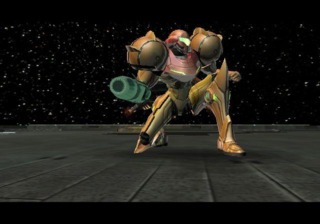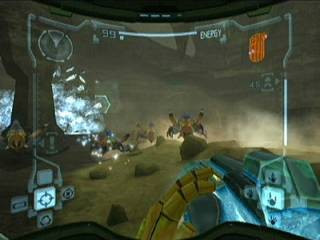Metroid and Me, Part 7: Solitude
By majormitch 3 Comments
Welcome to the seventh and final part of “Metroid and Me,” and the end of my personal examination of what makes Metroid such a special franchise for me. A big thanks to anyone who’s made it this far, and if you’re new I urge you to head on back to part one and start from there; you can find links to previous parts below. Before wrapping up, however, there is one final topic to discuss. We’ve covered a lot of ground when it comes to Metroid’s worlds, atmosphere, and gameplay, but there’s still one more very important topic that manages to exist slightly tangential to everything else. Metroid has always succeeded in creating a strong sense of isolation, and while that may sound like a strange thing to praise, it’s also the cherry on top of my love for this franchise. Today we’re going to explore why, and hopefully it brings the idea of this blog full circle as well. This has been all about me and my connection with Metroid after all, so it’s fitting that we end with perhaps the most personal topic of this series: isolation.
| Remix Title: Solitude | Original Song: Tallon Overworld (Metroid Prime, 2002, GameCube) |
| Remixer(s): zircon and C-GPO | Original Composer(s): Kenji Yamamoto and Kyoichi Kyuma |
Solitude
As you stand there surveying the path before you, ready to step foot into the final gauntlet, you reminisce on your journey to this point. You remember getting turned around numerous times, yet you always managed to find the way eventually. You remember all the tough foes you fought, the scars from which still linger. You remember all of the little triumphs and failures along the way, and how you’ve learned and grown at every step. You gather up that experience and use it as fuel for the next push; your mind is sharp, and your determination strong. You may be out here alone, and nobody else may ever hear of this journey you’ve undertaken. But you know how far you’ve come. That’s all that matters.

In many ways, the journey of Metroid can be a lonely one. You spend hours and hours on an alien planet with no other human characters in sight, much less interact with actual human beings. There are plenty of single player games out there, but how many of them go so far as to be single human games? Metroid is one of the rare examples, and it lends the game a distinct and identifying sense of isolation. There’s no one to share your struggles and victories with, no one to pull you up when you fall, and no one to pat you on the back when you succeed. You’re out there on your own with nothing to rely on but your wit and perseverance, and that has the potential to make the journey more personally resonant as a result. Solitude is often seen as a pejorative in the larger societal view, and for some it’s a scary thing to consider. But at its best, it can offer those who embrace it a safe space to live, explore, and express themselves to the fullest. It’s a way to focus without distraction, to form your own thoughts about the world around you, and to act in a way that feels most natural and true to who you are without judgement. That’s exactly the kind of space Metroid provides, and it’s a space I greatly enjoy being in.
Metroid takes the idea of isolation about as far as any game does too. As I mentioned, there are rarely any other human characters in a Metroid game (at least in the best ones), and I believe going to this extreme makes it even easier to become immersed in the game’s worlds. Video games can do a lot of things extremely well, and have improved their capabilities by leaps and bounds over the years as technology and design have advanced. But one important thing that’s yet to be fully solved are NPCs, especially human ones. Whether they move stiffly, repeat the same lines of dialogue, or simply act in a fully predictable or robotic manner that’s not indicative of actual human behavior, there’s always something “off” about them. Games that swing hard in a more artistic direction can get around some of these issues, but not all of them. As such, constant interaction with awkward NPCs is a pretty quick way to remind me that, yes, I am playing a video game. That’s not necessarily a bad thing on its own, but it makes getting swept up in a captivating video game world a tough sell. Seeing as Metroid trades primarily on its worlds and your exploration of them, it would only become more difficult (if not impossible) to truly immerse yourself if you were constantly watching and listening to human characters that aren’t believable as humans. Metroid acknowledges this limitation, and embraces it.

It’s for this very reason that Metroid’s heavier focus on natural environments makes a lot of sense. I personally enjoy natural environments over human ones anyway (that goes back to my preference for external sensing), and in video games such a focus can provide engaging locales without the awkwardness of human NPCs. To push it even further, Metroid’s places and creatures are all alien. We have a good idea how a wolf might look and move in a forest, for example, and it would quickly stand out if that scenario wasn’t portrayed realistically. But what about fighting Ing in a poisonous swamp on the planet Aether? That’s something we’ve only seen in Metroid, which leaves no room for any sort of dissonance or inconsistency. Metroid gets to define its own look and feel at every turn, which means you’re not just isolated from other human players and other human characters; you are isolated from anything remotely resembling the “real world” at all. Everything you come across is new and unfamiliar, and the game’s stellar atmosphere does a great job at bringing it all to life in an effective way. You’re out there on your own in every possible way, with none of your existing knowledge or experience from outside the game to aid you.
For me, this extreme level of isolation is comforting. I’m an introvert, and a big one at that; every official personality test I’ve ever taken has said “100% Introvert” in bold somewhere in the results. And while being an introvert does not mean that I don’t value the company of other people (far from it in fact), you’d be hard-pressed to find someone who finds merit and comfort in solitude more than me. Without getting too deep into the psychology of it all, being an introvert primarily means two things. First, I’m overstimulated easily, and have a harder time focusing with a lot of people around. Second, being around a lot of people is draining, while being by myself is energizing. Put these together, and it’s no surprise that the moments I feel the most dialed in and alive are primarily solitary ones. These are the moments where I feel like I’m able to apply myself fully, where I’m free to use all of my facilities to tackle the challenges before me without distraction. Metroid revels in these moments, and pushes them as far as it can by avoiding anything that would be familiar. When I dive into a Metroid game, I get to completely leave everything I know behind. I get to start from scratch, with no prior knowledge or expectations, and can be myself and find my own way. Being the strong introvert I am, this makes for a highly satisfying experience, and it’s one that Metroid has created time and again.

Finally, a word about Metroid’s (mostly) silent protagonist, Samus Aran. She is certainly not the only silent protagonist in video games, but I think that choice is particularly poignant here. On a surface level it makes clear sense; there’s no one else for her to talk to anyway. But more to the point, having Samus talk would again provide awkward, immersion-breaking dialogue (similar to the NPC issue). This has extra ramifications coming from the player character, as it would highlight the fact that the character you are playing is not you. The silent protagonist allows the player to project themselves onto their character, and feel as though they are playing “themselves” to some degree. I may be a pasty, skinny white dude instead of a 6’ 3” tall Amazonian woman in a power suit, but I’ve never had any problem identifying with Samus while playing Metroid. Her adventure is my adventure, and her goals are mine; there’s nothing she does to make me think otherwise, which makes it even easier to get sucked in. In addition to being more immersive, this also contributes to the sense of isolation. Speaking protagonists, with a fleshed out personality, can often feel like a buddy even when you are controlling them. Metroid avoids even this level of companionship. You are the player character, which further enforces how isolating a Metroid game really is.
Video games have stereotypically been seen as a loner’s hobby, frequently associated with socially awkward people sitting alone in a dark and messy basement, staring at a screen into the wee hours of the morning. However, I’d argue that a majority of video games rely on some sort of social appeal to be successful. Whether it’s through multiplayer, online communities, or simply telling human stories that exist in a social context, video games do a number of great things to foster and encourage human interaction. Metroid, then, stands as a fairly unique experience for the lengths it goes to isolate the player. More importantly, Metroid illustrates how powerful isolation can be, and how it can be a positive force for the right people. I happen to be one of those people, and Metroid has spoken to me very strongly as one of the few games to support solitude that well. It provides a wonderful space for me to explore and be myself, and that’s another significant reason why this series holds such a special appeal for me.
Conclusion
I titled this final part “Solitude,” which is fitting for multiple reasons (in addition to being the name of the excellent remix showcased above). Primarily, it hints at today’s theme of isolation, a very prominent theme in Metroid games, and an important one for me as we’ve now discussed. But there’s another reason that makes it fitting for this final part specifically. Through the seven parts of this blog series, I’ve discussed in detail numerous aspects of Metroid, and why they are so important to my affection for the series. A sense of adventure, strong atmosphere, stellar world design, numerous facets of gameplay design, and a feeling of isolation are all critical pieces of the Metroid experience for me. None of those individual pieces are unique to Metroid, however. I alluded to it a few times along the way, but any one of those aspects by themselves are shared with plenty of other games I greatly enjoy. Metroid is only one of hundreds of video games I like, and it should be no surprise that most of those games do things that sit well with me and my personality. In other words, things I’ve discussed in this blog series.

What makes Metroid special, then, is that it exists in solitude as the one game I’ve played that successfully executes on every one of these ideas simultaneously, and pushes them to their limits. This is the game that best captures all the nuances of my video game preferences, and comes the closest to being my own personality represented in video game form. And that’s ultimately what I wanted this blog series to be about. While I talk a lot about Metroid and its many excellent qualities, this has really been about expressing my video game tastes and preferences through the lens of the game that captures them best. As I mentioned way back at the very beginning, different games connect with different people in different ways, and I find that dynamic very interesting. In each case it speaks as much to the person as it does the game, and it’s kind of magical that video games can do that for people in the first place. Metroid is the game that does it for me, and hopefully now after seven lengthy blog entries, we’ve discovered precisely why.
Thanks again to everyone who read this blog series; you’re all heroes. And special thanks to my brother (@wess on the site) for proofreading this thing and providing feedback. I put a lot of effort into this, and I sincerely appreciate anyone who came along for the ride. It’s easily been the most extensive, personal, and rewarding video game writing I’ve done to date. Also, happy 30th anniversary to Metroid, which happens to be this very week. Nintendo’s never going to celebrate this series themselves, so somebody has to, right? Finally, I just may have one more “bonus” part for this blog. It will be slightly different and more lighthearted than the existing parts, so come back next week if you’re curious! And with that, it’s time to sign off. Take care, and thanks again for reading!
